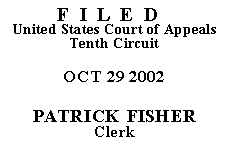

| CAESAR C. LATIMER, |
|
Before KELLY, McKAY, and MURPHY, Circuit Judges.
In 1996, Appellant Caesar C. Latimer filed an application seeking retirement benefits from the Tulsa County Employees Retirement Fund and System. The Board of County Commissioners of Tulsa County denied Latimer's application, concluding that he did not meet the minimum eligibility requirements. Latimer appealed the Board's decision to the District Court of Tulsa County, Oklahoma. See Okla. Stat. tit. 19, § 962. In 1998, the Oklahoma district court allowed Latimer to file a second amended petition wherein he asserted both a federal constitutional claim and a claim implicating the Employee Retirement Income Security Act. Three years later, on July 31, 2001, Latimer filed a notice of removal in the United States District Court for the Northern District of Oklahoma.
Appellees filed a motion pursuant to 28 U.S.C. § 1447(c) requesting the federal district court to remand the matter to state court. Appellees based their motion on the well-settled rule that 28 U.S.C. § 1441(a) authorizes only defendants to remove suits from state to federal court. See Shamrock Oil & Gas Corp. v. Sheets, 313 U.S. 100, 106-09 (1941). The federal district court granted Appellees' motion, concluding that removal was not authorized by 28 U.S.C. § 1441 because Latimer is not the defendant in this action. See Oppenheimer & Co., Inc. v. Neidhardt, 56 F.3d 352, 356 (2d Cir. 1995) (holding that for removal
purposes, "the plaintiff is the party who first invokes the aid of a court").
Latimer then brought this appeal.
From our review of the record, it is clear that Appellees' motion seeking remand was based on a defect in the removal procedure other than lack of subject matter jurisdiction and the district court granted the motion on that basis. See Flores v. Long, 110 F.3d 730, 732 (10th Cir. 1997) (holding that this court must determine by independent review the actual grounds upon which the remand was based). 28 U.S.C. § 1447(c) specifically permits a district court to remand a case based on a defect in the removal procedure. The Supreme Court has interpreted 28 U.S.C. § 1447(d) to preclude the courts of appeal from reviewing remand orders if those orders are based on a ground authorized by 28 U.S.C. § 1447(c). See Things Remembered, Inc. v. Petrarca, 516 U.S. 124, 127-28 (1995). Because the district court's remand order was clearly based on a ground authorized by 28 U.S.C. § 1447(c), this court lacks jurisdiction to review the district court's order and Latimer's appeal is dismissed.
ENTERED FOR THE COURT
Michael R. Murphy
Circuit Judge
*. This order and judgment is not binding precedent, except under the doctrines of law of the case, res judicata and collateral estoppel. The court generally disfavors the citation of orders and judgments; nevertheless, an order and judgment may be cited under the terms and conditions of 10th Cir. R. 36.3.